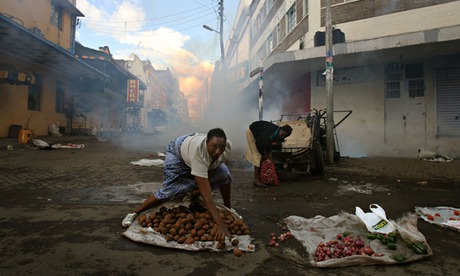Violence Against Women
Source: The Guardian
Six years after being gang-raped and beaten in front of her husband and four-year-old child during a wave of post-election violence in Kenya, Nancy is still awaiting justice.
If it were left to the country's director of public prosecutions, Keriako Tobiko, she would never see it. Last month, Tobiko announced that his office would bring no cases related to the 2007-08 atrocities before a new international crimes division (ICD) within the high court.
Nancy refuses to take no for an answer. On Tuesday she and other survivors of sexual and gender-based violence will be in a Nairobi courtroom, suing Tobiko and other senior government officials on numerous counts, including the failure to investigate and prosecute their cases and those of thousands of others.
Tobiko, along with the attorney general, Githu Muigai, another respondent in the case, was happy to promote the ICD to the Rome statute of the international criminal court (ICC) at a meeting of state parties in The Hague in November. Why there? The Kenyan president and deputy president, Uhuru Kenyatta and William Ruto, face charges at the ICC related to the post-election violence, so the country's two top prosecutors were eager to leave a good impression with foreign diplomats that Kenya is willing and able to deal with the atrocities domestically.
Indeed, last month Tobiko claimed a special taskforce had reviewed 5,000 cases related to the period, and 1,000 of these had been prosecuted, with 500 convictions. Yet the government will not provide any information to substantiate this claim, which is contradicted by the record of impunity and prior statements about the nature and extent of investigations and prosecutions made by Tobiko's office.
What we do know is that there have never been prosecutions of mid- and senior-level offenders, including many police officers, and that for most survivors, the Kenyan justice system has been unresponsive, at best.
After her ordeal, Nancy, aided by other women, went to Nairobi Women's Hospital, where several tests were carried out. Armed with the results, she went to the local police station, where she was given a report number. Many women did not even get that far; their attempts to report crimes were often met with laughter and derision by officers.
Detectives contacted Nancy months later. She showed them where the assault happened and identified her attackers. But the matter was never pursued. She and thousands of other women – and some men – who experienced sexual violence feel abandoned by the government. Kenya's constitution grants Tobiko the authority to order fresh investigations, but he has not done so.
The case being heard on Tuesday is being brought by eight survivors and four civil-society organisations. This is not the first such constitutional case. Last year, a judge in central Kenya ruled that by failing to investigate 160 rapes of girls aged three to 17, Tobiko and the police had "contributed to the development of tolerance for pervasive sexual violence", and that their failures violated multiple provisions of national and international law.
He ordered detectives to investigate the cases of the 11 petitioners concerned, and to implement an article of the constitution that requires the police to implement standards of professionalism, integrity and respect for human rights.
Kenya's 2010 constitution has many progressive elements, and legislators have proposed or approved numerous laws, which, if implemented, would make significant contributions to ending the climate of impunity for sexual violence. They would also strengthen women's rights in such areas as administrative law and democratic representation. But for now, women must continue to fight for a Kenya in which sexual violence is no longer tolerated.

Thousands of Kenyan women were victims of sexual and gender-based violence during the country's 2007-08 elections. Photograph: Uriel Sinai/Getty Images
